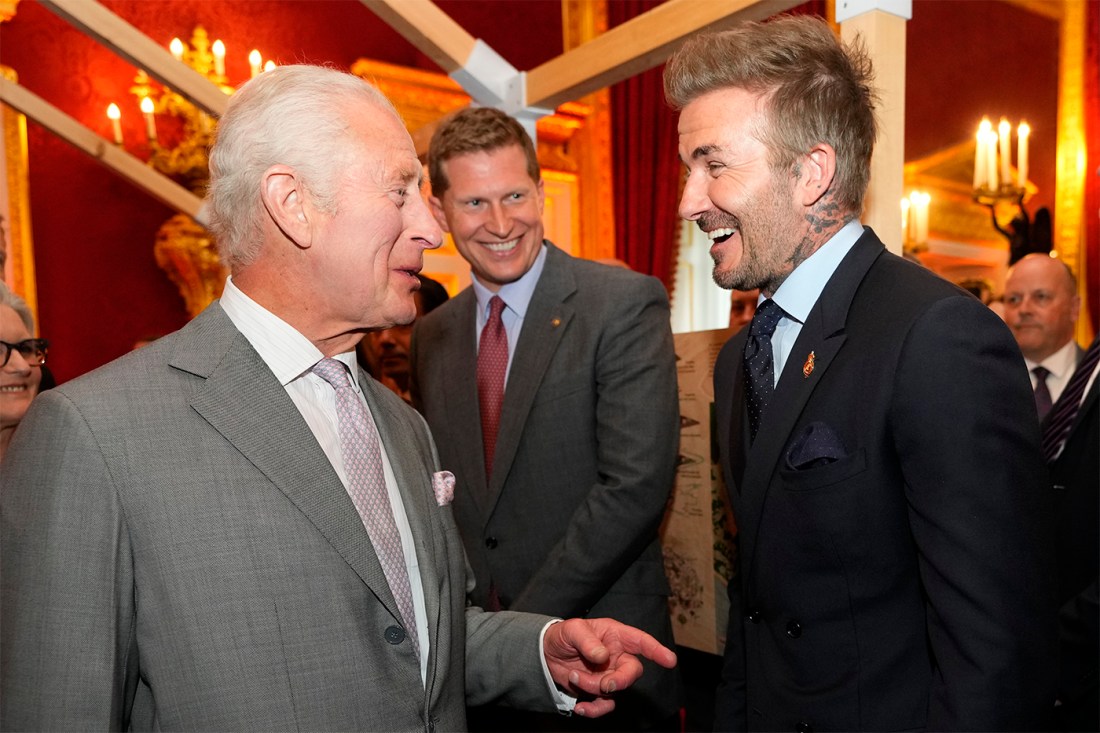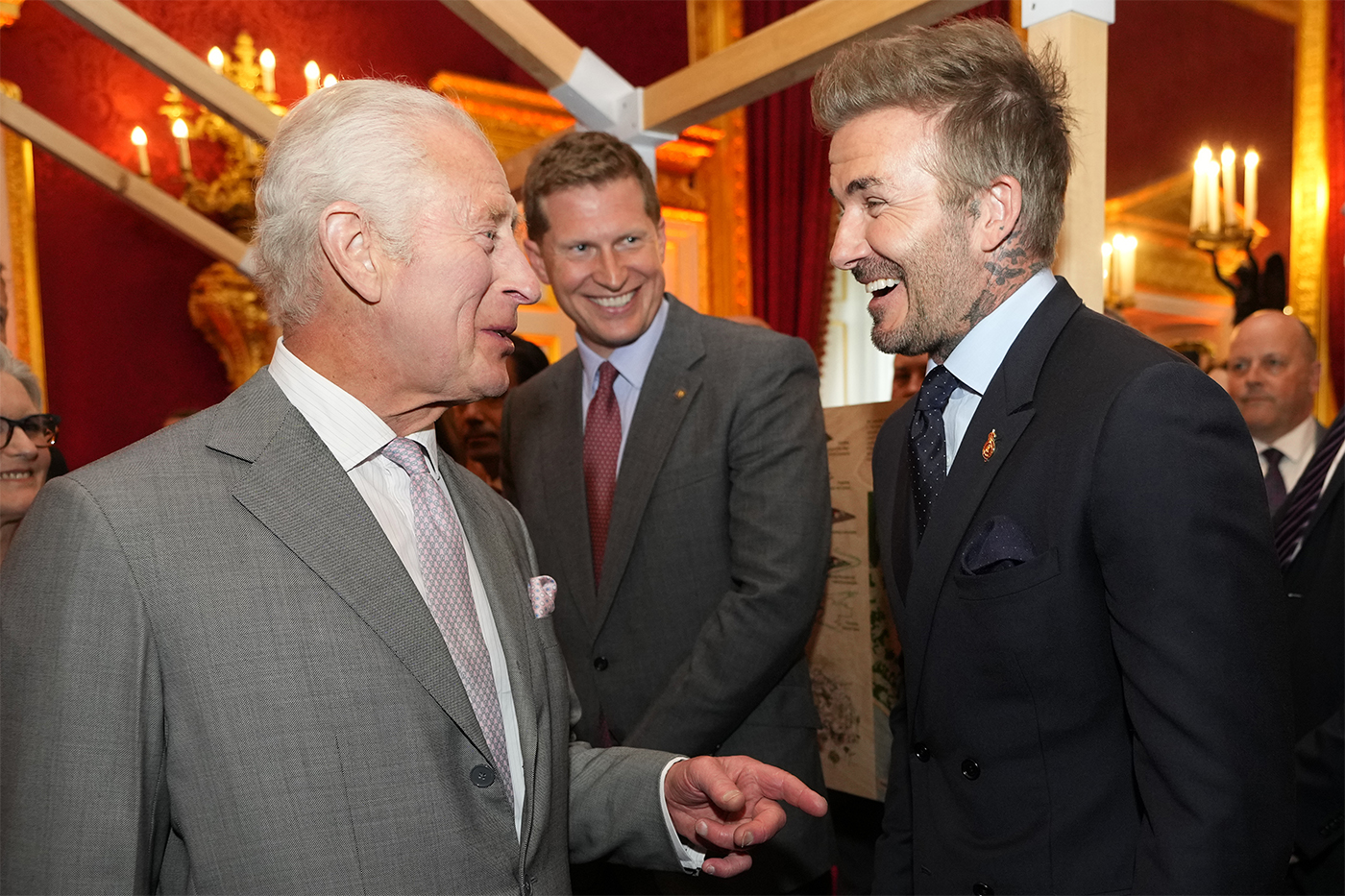Academics in politics, sociology and history at Northeastern University in London look at the significance and origins of the U.K. honors system.

LONDON — “Arise Sir David,” will come the call from King Charles when he formally makes ex-footballer David Beckham a knight of the British realm.
The former free-kick maestro and co-owner of Inter Miami football club will have a sword ceremonially “dubbed” on each shoulder by the British sovereign as he joins a modern brigade of sport stars, musicians, TV personalities and everyday citizens to be given a U.K. honor.
Due to join him in the rank of knight at a royal investiture ceremony will be Roger Daltry, lead singer of the rock band The Who, and actor Gary Oldman, who starred in Christopher Nolan’s Batman trilogy.
All three were announced as part of the King’s Birthday Honours in which more than 1,200 people from across the U.K., ranging from age 11 to 106, were recognized, with knighthoods and damehoods being two of the highest ranking awards handed out.
Josephine Harmon, an assistant professor in political science at Northeastern University in London, says the knighting is partly about modern Britain’s projection of itself on the world stage.
“The knighthood system is sending out signals about Britain’s cultural exports,” says Harmon, “whether it is soccer and David Beckham, The Beatles or whether it is Gary Oldman being known for playing all these different acting parts.
“It says something about the country and the fact that we think of ourselves as punching above our weight in cultural terms. After the economic and relative decline after the age of empire, Britain pivoted its image of itself and what it does as a country within the world.
“Part of that was famously about financial services and other services. But another major part is our cultural sector and the way that we export our music, our films, our playwrights and whatever else. The honors system is related to that image of modern Britain.”
People can be nominated, and the monarch announces a new set of recipients twice a year in the birthday and New Year’s lists. The choices are vetted and approved by a committee beforehand. Other times, honors are given when Parliament has completed a full term, known as dissolution honors, or when a prime minister resigns.
“Gongs,” as they are colloquially known, are typically given to well-known personalities, government employees and ordinary people who have served their community with distinction.
Beckham, who previously played for Manchester United and Real Madrid and is estimated to be the eighth highest-paid athlete of all time, is a rare breed in that he is known to have publicly courted a knighthood. Leaked emails from 2013, published four years later, used colorful language to express his displeasure at being snubbed for a knighthood, allegedly calling the British knighting system an expletive.
A “red flag” had reportedly been raised by the U.K. tax office concerning Beckham’s financial investments, an issue that held up any chance of a knighthood until it was cleared in 2021. But after having been a regular attendee at royal events and weddings — along with Spice Girl wife Victoria — carrying out charitable works and having already been bestowed with the lesser honor of Order of the British Empire (OBE) in 2003, he has been given the top accolade of a knighthood.
Beckham’s elevation, says Gergana Dimova, associate professor in politics and sociology, gives the monarchy a chance to align itself with one of Britain’s most-recognized and high-profile cultural stars and offers the opportunity to modernize itself in the process.
“The modern monarchy is constantly reinventing itself,” says the London-based Northeastern academic, “and one of the most viable ways for it to stay relevant in the age of social media is to reach out to celebrities.
“David Beckham is the ultimate celebrity as he has managed to galvanize his sports success into a palpable public presence. A testimony to the power of his image is that he has 88.2 million followers on Instagram and earns around $40 million from brand endorsements. He is the epitome of the good looking, successful, modern man.”
Dimova says a knighthood and damehood can also allow the recipient to reform or reinforce their own image. In Beckham’s case, it offers the chance for the newly minted “Sir David,” who comes from a working-class background, to align himself with the establishment.
“Knighthood is mutually beneficial,” continues Dimova. “By accepting the knighthood, Beckham moves from the realm of new money to the polished world of tradition.”
Beckham, 50, seemed to recognize that journey himself when he said after the announcement: “Growing up in east London with parents and grandparents who were so patriotic and proud to be British, I never could have imagined I would receive such a truly humbling honor.”
Similarly, others, such as pop star David Bowie and film director Danny Boyle, turned down knighthoods so as not to be seen as tied to the establishment or the institution of the monarchy.
While becoming a knight or dame does not come with any formal elevated position, Harmon argues that there is still an undefined authority that arises from being afforded the distinction. In fact, people who fall below the standard expected of those holding the rank can be stripped of their honor, as was seen when Queen Elizabeth II’s courtier Anthony Blunt was ousted as a spy for Russia.
“I think there are certain forms of power which are not tangible,” Harmon says. “An honor doesn’t involve legal powers over people. But there is this cultural, social authority that you get just from this title and from this recognition that people are impressed by it.”
The U.K. is not alone in having such a system for recognizing citizens’ achievements, Harmon points out. In the U.S., the Presidential Medal of Freedom and Congressional Gold Medal are given to citizens for their merits. But it is the history of the British honors system that helps to set it apart.
Chloe McKenzie, assistant professor in medieval history, explains that the concept of bestowing knighthoods can be traced to the eighth century in Western Europe, and that it became ingrained in British life after the Norman conquest in 1066.
“In medieval society, there was a three-tiered society, which comprised of those who fight, those who pray and those who work,” says McKenzie. “And those who fought were the knights, and they were the natural leaders of society.
“The Norman conquest solidified that social structure. William I used his knights by rewarding them with lands and they in turn subjugated the local population in the decades after the conquest. But things really start to shift, I would say, in the 13th and 14th centuries when the honors system, as we would recognize it, comes into being.”
McKenzie says that, prior to the 1300s, it was mainly military men from a certain class or background who were knighted. But around 1348, King Edward III founded the Order of the Garter, which remains to this day the pinnacle of the U.K. honors system, with the likes of Tony Blair, the former prime minister, inducted in 2022.
The Order of the Garter started off as a way of rewarding Edward’s military leaders after his victory over the French at the Battle of Crecy in 1346, with the knights belonging to the order “supposed to be beyond reproach,” explains McKenzie, who is currently researching the order’s early history.
As time went on, the order’s function changed to being first about promoting King Edward’s family and helping create family unity before turning political.
“As the 14th century wears on and goes into the 15th century, the Order of the Garter takes on more of an overtly political function, and that evolves over time,” says McKenzie.
“You stop having people who are military commanders, and you might have somebody who is politically useful to reward.”
Other honors rankings would go on to be formed, such as the Order of the Bath in the 18th century and the Order of Merit in 1902, but, according to McKenzie, they can all trace their origins to those medieval rulers wanting to celebrate their most impressive subjects.
“They are part of that same system of rewarding people for different purposes,” McKenzie adds.
